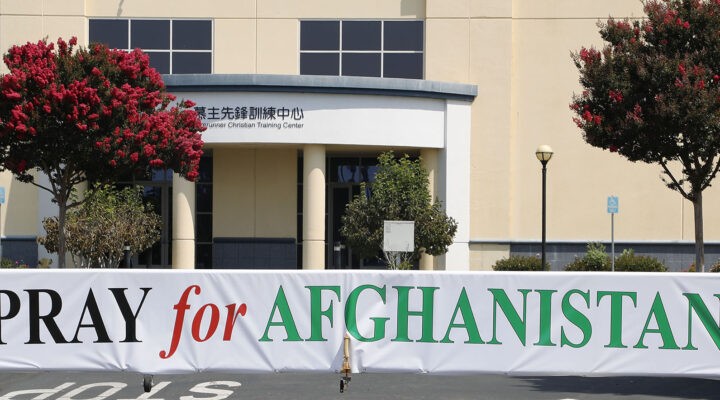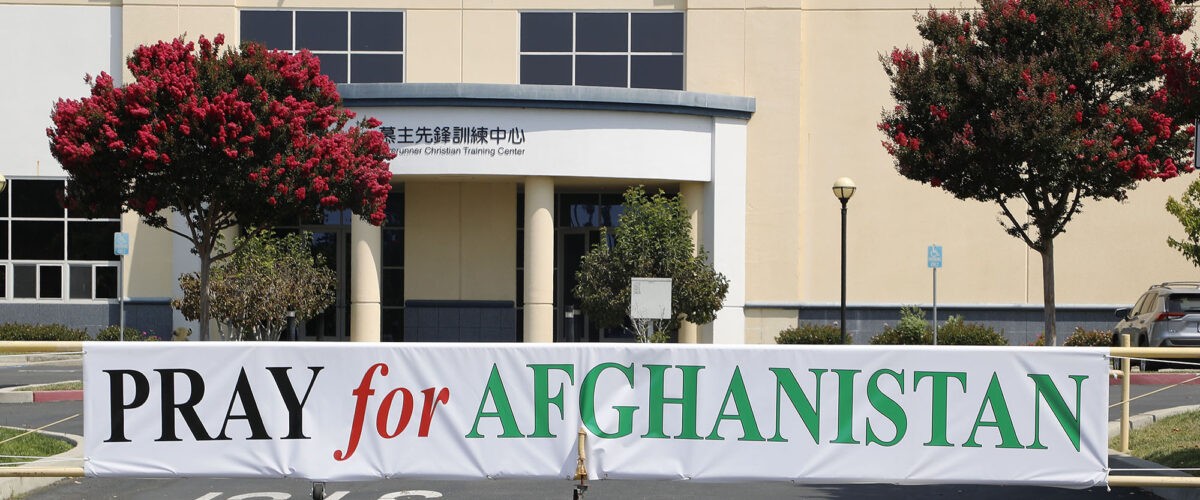Afghan Christians who failed to escape when their nation fell to the Taliban in August live in constant isolation and in fear that the fundamentalist Islamic government, and practically the entire society, is out to persecute them, according to the leader of an Afghan house church community.
“The Taliban, their plan eventually is the elimination of Christianity, and they have been very open about that,” the head of the Afghan House Church Network, identified only as Luke, said during a recent episode of “USCIRF Spotlight,” the weekly podcast of the U.S. Commission on International Religious Freedom.
All the estimated 10,000 to 12,000 Christians currently in Afghanistan are converts from Islam, making them all the more abhorrent to the fundamentalist Sunni regime that seized Kabul when U.S. forces exited the country last year, he said.
And that makes the ramifications of their conversion even more serious, he explained. “The moment an Afghan decides to follow Christianity, they know there are a lot of consequences. You can lose your job. University students can get kicked out of school, even from private universities. Some have lost the custody of their children, and they can lose their possessions. They can even lose their lives.”

Dwight Bashir
Speaking from an undisclosed location outside Afghanistan, Luke told moderator Dwight Bashir, USCIRF’s director of outreach and policy, that Christians also faced serious challenges during the U.S. occupation of Afghanistan beginning in 2001.
“Even in the former government, there were groups of people from the attorney general’s office to the judges to the police — they have been hunting Christians,” he said. “So, there are no protections at all for the Afghan Christian community from the family all the way up to the Taliban. That makes them very secretive and reclusive.”
Christians aren’t alone in the most-hated category with the Taliban and other Afghans, USCIRF explained in an October 2021 fact sheet about religious minorities in Afghanistan. Ahmadi Muslims, Baha’is and non-believers also are despised and therefore “are unable to express their faith or beliefs openly because they face dire consequences, including death, if discovered by the Taliban.”
The Ahmadi are universally loathed by both the Sunni and Shiite sects of Islam. “Today, Afghan Ahmadis practice their faith in secret due to continued societal persecution and discrimination,” USCIRF reported.
The Baha’i, whose tradition originated in Iran, were persecuted in Afghanistan before the rise of the Taliban in the mid-1990s, according to the fact sheet. “In 2007, the General Directorate of Fatwas and Accounts of the Supreme Court declared the Baha’i faith to be blasphemous and their followers to be infidels. The Baha’i community has lived in secret since this ruling.”
Those who claim no religion also have targets on their backs, USCIRF explained. “Nonbelievers — who lived in fear even under the Western-backed government — are worried that their neighbors may turn them in to the Taliban. Atheism and agnosticism are considered apostasy and punishable by death, according to the Taliban’s interpretation of Islam.”
Christians also are viewed through such a hostile lens, USCIRF added. The faith has no historic organizational presence in Afghanistan and has been treated by its strict Islamic laws with the harshest of penalties even though early Christianity had reached what today is known as Afghanistan.
 Acts 2:9 mentions ethnic Jews and converts to Judaism from the Parthian Empire, which included parts of what today is western Afghanistan as being present at the Day of Pentecost. And according to the ancient historian Eusebius, the apostles Thomas and Bartholomew were assigned to a Christian mission in Parthia.
Acts 2:9 mentions ethnic Jews and converts to Judaism from the Parthian Empire, which included parts of what today is western Afghanistan as being present at the Day of Pentecost. And according to the ancient historian Eusebius, the apostles Thomas and Bartholomew were assigned to a Christian mission in Parthia.
However, when the Ilkhan Empire adopted Islam as a state religion in 1295, Christianity all but disappeared from Afghanistan and Persia during the reign of Timur (1336–1405).
Today, Afghanistan ranks among the world’s countries with the least Christian presence.
“Converts who already faced ostracization and the threat of honor killings by family and village members are now at heightened risk with the Taliban in power,” according to the USCIRF report. “Societal actors, the former Afghan government, and the Taliban often view conversion as an attempt to flee Afghanistan by seeking refugee status as a member of a persecuted religious community.”
Bashir added that the outlook for all minority faiths is bleak, including for “Christian converts who practice their faith in hiding due to their fear of reprisal and threats from the Taliban as well as the Islamic State in Khorasan Province, also known as ISIS-K. Some Afghan Christians receive regularly threatening phone calls, and the Taliban reportedly has gone door to door hunting down converts — a very chilling reality to say the least.”
Luke explained that among the first Afghans to become Christians in the modern era were residents of refugee camps in neighboring nations during the 1980s and 1990s — roughly the time of the Soviet invasion and occupation. However, the faith grew from an estimated 100 into the thousands after 9-11, when the U.S. and coalition forces swept the Taliban from power.
But with the Islamic fundamentalists back in control, the Afghan House Church Network and other Christian groups have gone underground despite Taliban promises of some social reforms.
“They have been talking about women’s rights and freedom of speech and other things, but it never comes down to freedom of thought or freedom of religion.”
“They have been talking about women’s rights and freedom of speech and other things, but it never comes down to freedom of thought or freedom of religion,” Luke said.
Instead, the government has resorted to threats of imprisonment and execution against Christians through letters and social media because they are considered infidels, he added. The Taliban say “‘we will find you and we will kill your entire family to bring you the punishment you deserve and to be a lesson for others who are leaving Islam.’”
It isn’t only the government that Christians and other religious minorities have to fear, he said. “In the eyes of local imams, the Taliban and even other religious communities there, they are apostates.”
Christians often are unwelcomed in their own families and villages and as a result are frequently unable to work or provide for their families. “People think that if they tip off the Taliban they may get some sort of recognition. And in many cases because of the fear, members of the family are casting them out saying, ‘You are a headache for us and you need to leave.’”
That is, in itself, a brutal punishment in a society that is communal instead of individualistic, he explained. “You may be living in the same village or town, but you are in exile. … In many cases you might not be able to draw from the (village) well.”
Related articles:
Escaped from Afghanistan: One family’s story of terror | Opinion by Judy Kuriansky
Supporting the influx of Afghan refugees is bringing divided Americans together


